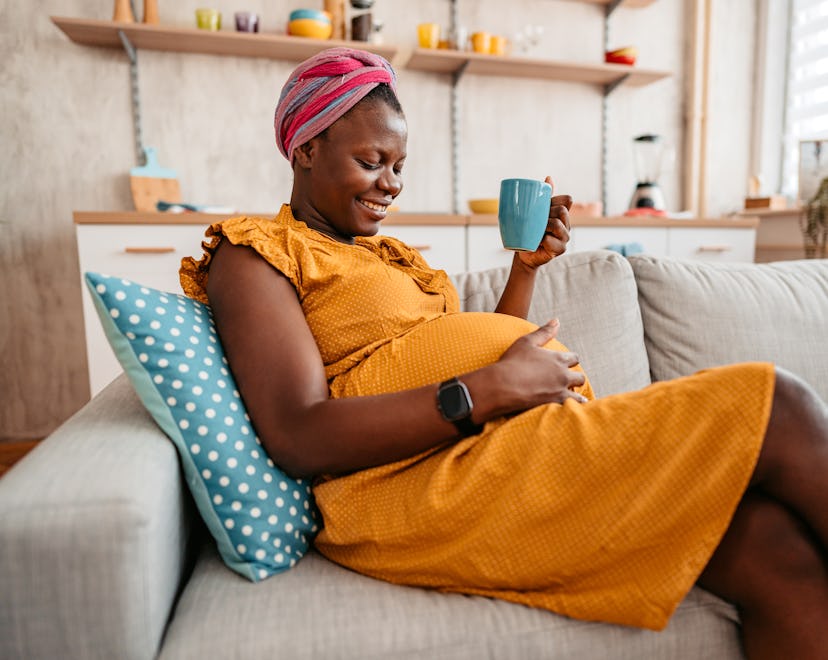Pregnancy

How To Drink Green Tea Safely During Pregnancy, According To Experts
All your questions answered.
Being pregnant means forgoing some of your favorite food and beverages in order to keep both you and baby as safe and healthy as possible. This is especially true when it comes to anything caffeinated. While you don’t have to avoid caffeine completely when you’re pregnant, it is recommended to limit your intake. Most people are quick to cut out coffee from their diet, but that general rule of thumb applies to some teas also, like green tea. You might wonder if green tea is safe during pregnancy, or if it’s something you should wait to drink after you give birth.
Medical experts give green tea during pregnancy the green light, as long as it’s consumed in moderation. “It is safe in limited quantities,” says Sunny Soroosh, certified nurse midwife and nurse practitioner. Green tea might even have some benefits that are worth considering when you decide whether or not you want to have caffeine during pregnancy.
What are the benefits of green tea?
Green tea has a slew of health benefits for non-pregnant and pregnant people. High in antioxidants with a low sugar content, it can improve wellnesss, says Joy Cornthwaite, registered dietician, an OB-GYN nutritionist with UTHealth Houton and UT Physicians. Green tea contains natural chemicals called catechins, and studies have shown that the specific compound epigallocatechin gallate (EGCG) found in green tea can decrease inflammation and lower cholesterol, as well as promote heart health.
Green tea also contains an amino acid called L-theanine, and studies have shown that this can reduce stress and anxiety, which might be especially helpful during pregnancy. Some research has also shown that caffeine can improve brain function, mood, reaction time, and memory.
How much can I drink when pregnant?
Green tea contains a decent amount of caffeine — almost as much as espresso and some brewed coffees. According to the American College of Obstetricians and Gynecologists (ACOG), a moderate amount of caffeine consumption (defined as less than 200 milligrams per day) will not cause miscarriage or preterm birth, and an 8-ounce cup of green tea contains approximately 30-50 mL of caffeine.
The amount of caffeine in green tea can vary depending on type and steep time, so be sure to keep track of how much caffeine is in your green tea. You should also keep track of how much caffeine you’ve had from other sources, like coffee, chocolate, or other foods.
“Most pregnant people can safely drink 200mg of caffeine daily during pregnancy,” says Kelly Johnson-Arbor, MD, FACEP, FUHM, FACM, medical toxicologist, co-medical director, and interim executive director from the National Poison Center. “However, because some people are more sensitive than others to the effects of caffeine, this recommendation may not be the same for everyone.” Be sure to ask your OB-GYN how much caffeine you should have during your pregnancy.
What are the risks of drinking green tea when pregnant? Is it safe for baby?
While green tea has plenty of benefits, it also might have some risks. “Green tea absorbs folic acid, which is a necessary nutrient in pregnancy because it helps to prevent neural tube defects such as spina bifida,” Soroosh says. “This nutrient is especially important in the first trimester, when many of the neurological structures are developing.” She points out that, theoretically, green tea could prevent your body from absorbing enough folic acid and could cause neural tube defects (something that this 2012 research found), but you would have to drink a lot of it for that to happen. This is one reason people may avoid green tea completely or at least during the first trimester.
There are also some risks associated with having too much caffeine during pregnancy. In 2021, the National Institute of Health reported that pregnant women who have even as little as half a cup of coffee a day on average gave birth to slightly smaller babies than pregnant women who did not consume caffeine. Small birth size can put infants at a higher risk for conditions like obesity, heart disease, and diabetes later in life.
Some studies have also shown that consuming high amounts of caffeine during pregnancy can be associated with negative fetal outcomes, including miscarriage. “Caffeine can cross the placenta, but the fetus cannot metabolize it,” Johnson-Arbor says. “In addition, the body’s metabolism of caffeine is slower in pregnant people compared with non-pregnant individuals, resulting in increased fetal exposure to the drug.”
Lastly, Cornthwaite notes that some studies have found some correlation between an increased risk of dehydration, undesirable changes in blood pressure, low birth weight, and miscarriage in pregnant women who drink more than 200mg of caffeine daily.
In conclusion
At the end of the day, green tea is considered safe for pregnant people to drink, as long as they have it in moderation (less than 200mg of caffeine each day). That said, it does come with some risks that are worth considering, and it’s always something to speak with your OB-GYN about. Whether or not you drink green tea during pregnancy is a personal decision.
Sources
Sunny Soroosh is a certified nurse midwife and nurse practitioner at Lenox Hill Hospital in New York.
Joy Cornthwaite, registered dietician, is an OB-GYN nutritionist with UTHealth Houton and UT Physicians
Kelly Johnson-Arbor, MD, FACEP, FUHM, FACM, medical toxicologist, co-medical director, and interim executive director from the National Poison Center
This article was originally published on